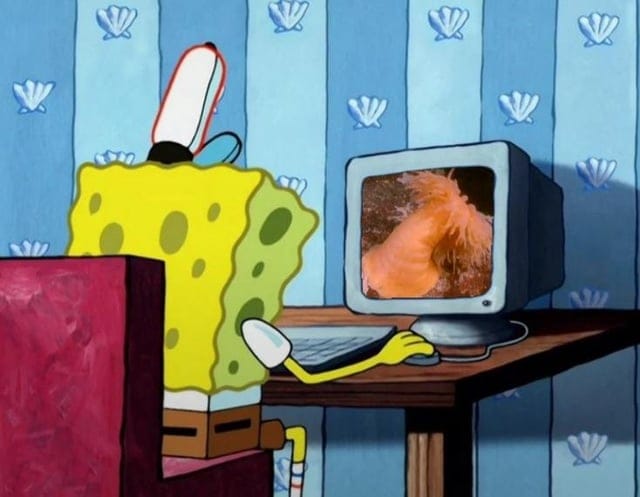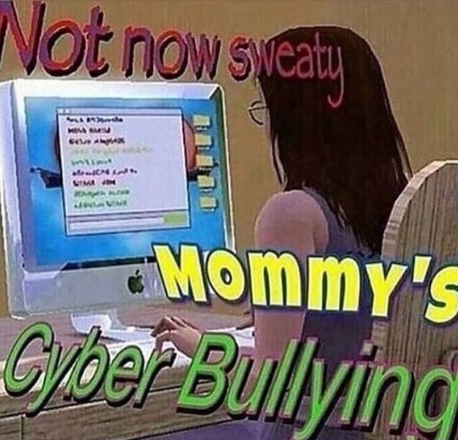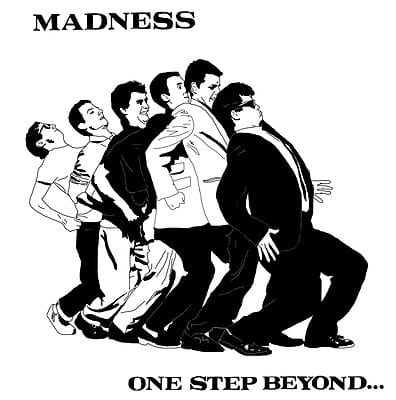A World In the Grip of a Terrible Onlineness

When the pandemic began, back in those flopsweat days of March 2020, I came to a horrible realization.
Due to necessary quarantines, lockdowns, travel restrictions, and general social disruption, the human race was going to be forced into a state of collective and sudden Onlineness totally unprecedented in history.
Billions of people would, for the foreseeable future, have no social outlet available to them other than the Internet. Many people who had not previously been particularly Internet-focused would now become that way, in the absence of meaningful alternatives. While many people would likely benefit from the Internet as a social outlet, others might find themselves sinking into a far more poorly-balanced relationship with being online.
And what's more, this global and involuntary shift towards online forms of communication would be happening during a terrifying global crisis, which would inevitably inspire the creation of more internet-fueled conspiracy theories, scams, and paranoia.
As someone who has been extremely online since elementary school, the thought terrified me.
Unfortunately, I was pretty much right about this.
Humanity really did flock to the Internet in unprecedented numbers, a lot of people became extremely online who had not previously been so, and both the Internet and global society writ large do appear to have become considerably more deranged. (Especially in the United States).
Obviously, before 2020, there was a pre-existing trend of ever-greater and arguably more problematic human Onlineness in play. The main point is that I suspect the Covid pandemic markedly accelerated the various trends towards human behavior online that were already in play. And now, we're reaping the consequences in ever more surreal and unprecedented ways, as has been made abundantly clear by the last five months of non-Euclidean horror brought to us by the dual Musk/Trump regime in the United States.
I'm not speaking exclusively here of how this uptick in social media use has (probably) contributed to the rise and spread of extremism, hated, disinformation, and terrorism - I'm thinking in more broad and amorphous terms. Call it my lingering, unsettled sense that accelerated Internet use has led to an increase in people suffering from the symptoms of poster's madness.

Defining what poster's madness actually means is difficult. Here's some of the examples that come to my mind:
- The person who is broadly totally incapable of logging off, to such an extent that they're ignoring their own family at a birthday dinner in favor of arguing with someone on social media about if pants are racist.
- The person who claims to be so actively psychologically traumatized by online arguments and disagreements, many of which they compulsively start themselves, that they can't function (and who probably isn't lying about this, and who desperately needs a therapist, or a better therapist).
- The person who has fallen into a deep dark well of insane conspiracy theories, like the infamous QAnon movement, or the obsessive ChatGPT users who have fallen into terrifying LLM-induced spiritual delusions.
- The person who spends all their time mainlining and sharing horrific gore photos from global conflict under the belief that they're "witnessing," but who actually achieves nothing useful other than traumatizing themselves.
- The person who does not actually post very much, but spends all their waking hours scrolling an endless loop of cute animal videos and AI slop, to such an extent that they neglect work and personal duties.
- Literally everything Elon Musk does or says.

In other words, it's a term that describes actions and habits that most of us would agree are maladaptive Internet behaviors. It's what happens when being online is actively worsening someone's life. It's like watching Old Yeller succumb to rabies, except Old Yeller is a 40-something human being with an email job and they're succumbing to end-stage Poster's Madness.
I myself identify as a terminally online person, in the sense that I'm on the Internet all the time, I use social media a lot, and I'm (deeply embarrassingly) hyper-aware of the Internet's daily and hourly ebbs and flows of weird bullshit. However, I still manage to be a semi-functional human being. I think.
I try to moderate my social media use by logging out for much of the day, and I also try to regularly log out for days at a time, to break up the dangerous stimulus-response pattern I know that I'm capable of slipping into. I go to the gym. I have friends. I mostly succeed at putting my phone down when I'm having dinner with my family. I slip up sometimes, but I generally feel pretty OK about how, and how much, I use social media.
However, I've been chronically online since I was an 8-year-old typing rude words into virtual pet chatrooms. This has, I think, given me a certain advantage in that I have a lifetime of prior experience with how I feel and how I act when I'm using the Internet beyond my personal limits.

Don't get me wrong: my mind absolutely has been warped and perverted by the Internet into hideous and inhuman forms over the years. Scientists should probably study my brain as a cautionary tale about what happens when someone is allowed to use Something Awful and 4chan during a crucial period of teenage brain development. But I've learned to live with these cognitive mutations, much like how shrimp trapped in a cave will eventually evolve to navigate without eyes.
In other words, I'm well-adapted to my extreme, dumb, Internet environment, like a volcano snail sliming around a deep sea Internet vent.
You can also think of the phenomenon I'm describing as like the difference between how an experienced and mostly-responsible drinker controls their alcohol consumption, versus how a 17 year old college freshman who's never had mezcal before does so (or, usually, totally fails to do so until they learn the hard way).
To continue the analogy with alcohol, there are also some people who simply aren't capable of independently, moderately regulating their social media and Internet use. They're very prone to using it so much that it becomes a problem. This is by no means a personal or moral failing, any more than it is for someone to have an alcohol problem: we're all just wired differently, and have different thresholds for developing problematic dependencies on certain substances and behaviors.

I recall seeing a number of real-world examples of this problem during the first year of Bluesky, when some users found themselves with a significant social media following for the first time in their lives (in the early Bluesky sense, which was like a 1000 followers). Some of these people legitimately went mad with power, acting as if they were the god-kings of what was then an obscure and experimental social media website with less than 100,000 total users.
More than a few of those people flamed out in spectacular and intensely embarrassing ways, to such an extent that their offline lives were affected. Meanwhile, early Bluesky users who had more previous experience with even small amounts of Internet visibility (mostly from Twitter) seemed to be far less susceptible to this behavior.
The point is that people have to learn how to handle being extremely online, just like they have to learn how to hold their liquor. And some people just are never going to be great at coping with it.
Which brings me back to COVID-19.
It is my suspicion that a lot of the newly-online people created by the pandemic ended up developing Internet-use problems that they didn't have in the past, and they also weren't equipped with the defenses against total mind-rot that people like me and my already long-Internet-poisoned cohort have developed over time. (There is some evidence of this happening from China).
That led us to...here.
What do professional researchers who study how people use the Internet think about the impact of the pandemic on global rates of being terminally online?
Scientists have already put out some interesting work on how (or how not) this sudden Covid-era global uptick in extremely online behavior affected people.

Here's a few examples.
A study from this month analyzed the the social media use of 1478 participants in the USA and Italy during COVID-19, attempting to tease apart how accelerated Onlineness impacted personal well-being by means of directly comparing results from two different countries. They found that while Italians experienced stricter lockdown regulations than Americans endowed with the freedom to infect their neighbors did, both Italians and Americans increased their social media use at about the same rate.
They also found that emotional stability is negatively correlated with social media usage, a finding that a number of other researchers in other studies have validated, and which is intensely unsurprising to anyone who's spent a lot of time interacting with people on the internet. What may be more surprising to my extremely online brethren, who often tend to fancy ourselves introverted gremlins: extroverted people appear to be more likely to use social media and to create content.
Further, they found that while people did use social media more than they had in the past, most didn't engage with it more actively than they had before (in the sense of posting content, instead of passively scrolling). They did find that full-time employees were more likely to actually post than students were, and being American, female, and younger was also positively correlated with doing more actual posting, instead of merely scrolling.
Another recent study from Austria found that increased social media use during the peak of the COVID-19 pandemic had a largely negligible impact on personal well-being, though there was a small correlation between reading pandemic-related material and feeling worse: interestingly, the study also found that actively posting about the pandemic "generates stronger reactions, both positive and negative. It seems the often extreme, negative, or aggressive tone of COVID-19 discussions on social media53 could have stronger impacts on more active authors."
Yet another 2024 study on social media use during COVID-19 in the US examined the relationship between social media use early in the pandemic (in mid-April 2020), and how the same people (recruited from Amazon Mechanical Turk workers) were faring five weeks later. They found that those who used Facebook more had higher levels of perceived social support, but "also higher levels of cumulative Covid-related stress appraisals and post-traumatic stress symptoms."
People who used video chat apps frequently felt more socially supported and less lonely, but also experienced higher rates of the aforementioned cumulative and post-traumatic stress symptoms. Meanwhile, frequent use of Instagram and Snapchat predicted more anxiety and cumulative stress (with more PTSD symptoms from Instagram), but wasn't related to social wellbeing - perhaps indicating that these apps fueled less of a sense of social connection than the others.
Researchers further found that people who used social media to connect with friends for happy hour, exercise, and general chit-chat felt more socially supported, but also reported more cumulative Covid stress - probably because, as they theorize, people who felt more frightened of the virus were more likely to rely on social media for social interactions than those out merrily breathing on each other in public.
Basically, the findings line up with past research indicating that social media can be good for you or bad for you depending on your motivations for using it. This is highly intuitive to me as a social media user, and is also not exactly massively useful for society writ large, in that it's hard to stop people from using social media on the basis of Emanating Stanky Vibes.
It's considerably more complex to affirmatively say if increased Internet use during COVID-19 has directly helped to fuel extremism and much more general batshit-behavior globally, although I certainly personally believe that it did, to at least some extent.
One recent research paper examined the relationship between people's social and traditional media habits, their existing affinity for populism, their trust in scientific expertise, and their belief in COVID-19 misinformation, using survey data from Brazil, Poland, Serbia, and the United States.
Unlike some other research work in this area, this study found that social media in general didn't increase people's exposure to and belief in misinformation: these beliefs were specifically correlated with the use of messaging apps, like WhatsApp, Telegram, and Facebook Messenger. Interestingly, they also found that people who consume more podcasts were more likely to believe COVID-19 disinformation (a category of media that I'd categorize as Internet-related).
"Exactly how bad did a massive global increase in Internet use as a result of COVID-19 fuck up humanities spongy little ape brains" is, ultimately, one of those maddening long-term questions. It's the kind of thing we'll never be entirely able to answer, and will likely only start to get more solid information on a few decades from now.
Mainly, I think of the sudden acceleration in human Onlineness during the pandemic as one of the key factors that has led into the current perfect-storm of MAGA madness that's sweeping over the United States and the planet in general right now, coupled with the rise of AI slop and super-hype, expanding and highly visible income inequality, and general societal burn-out in the face of crisis-after-crisis.

Sometimes I try to reassure myself by thinking about how society's accelerating Internet-fueled insanity is all rather similar to the Western world's' collective freakout after the introduction of the printing press, and how that was eventually resolved: people adapted to the technology, eventually, and life went on. But then I remember that the introduction of the printing press still resulted in a century or two of religious and political turmoil that killed and impoverished a lot of people, and that I happen to be living right smack-dab in the middle of a similar inflection point in the Internet age.
I do believe that humanity will eventually, over the course of time, figure out how to wrap our aforementioned spongy ape brains around stuff like the Internet and AI. Our problem, as individuals, is figuring out how to get through all of this in one piece. And without going insane in the process.
That, I'm afraid, I have no good answers for.
I guess I'll keep posting about it.
